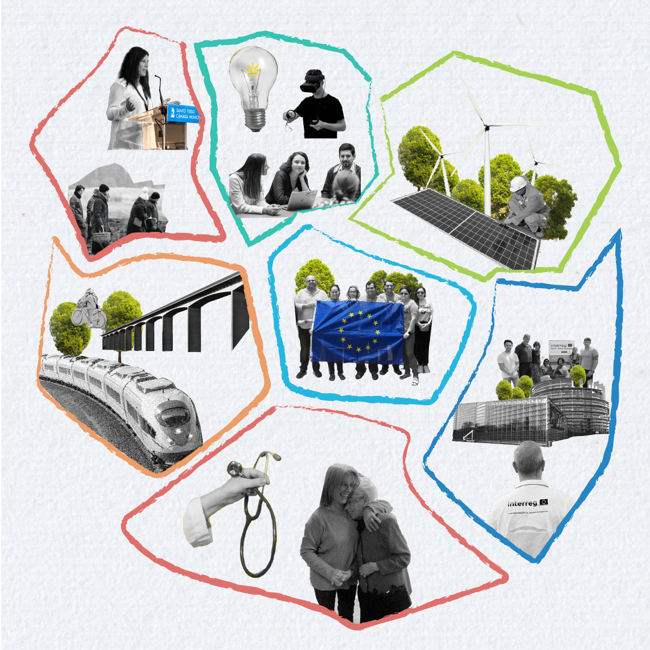Thematic objectives
Find detailed information about the thematic objectives of Interreg

What are the Interreg themes?
Turning Cohesion Policy into action
Interreg focuses on seven thematic objectives during the 2021-2027 period. These objectives are part of the EU regulation and reflect Interreg's mission to build a more united, inclusive and resilient Europe by promoting cooperation and addressing shared challenges. The seven objectives include five EU policy objectives and two Interreg-specific objectives.
Each thematic objective addresses a key area. Below, you can explore a brief description of each theme and learn how they contribute to both EU policy priorities and Interreg's broader mission.

A Smarter Europe
Interreg drives innovation, competitiveness, digitalisation, and smart specialisation across regions. It supports research, technology, and entrepreneurship to build strong, future-ready economies.
A greener Europe
Interreg invests in projects that promote a low-carbon economy, tackle climate change, and encourage a circular economy. It supports risk prevention, nature protection, sustainable energy, and water management to help build a greener, more sustainable future.
A more connected Europe
Interreg focuses on improving mobility by enhancing transport networks and digital infrastructure. This ensures better connections for people, goods, and information across regions.
A more social Europe
Interreg promotes inclusion, employment, and access to quality health, education, training, and skills. It also supports culture, sustainable tourism, and equality to create a fairer, more inclusive society.
Europe for citizens
Interreg adopts place-based and community-based approaches to support integrated territorial strategies. It prioritises local ownership and sustainable partnerships to address the unique needs of regions and communities.
Better governance
Interreg strengthens institutional capacity and encourages cross-border collaboration. It addresses legal and administrative obstacles, promotes mutual trust, and helps build more transparent, inclusive, and sustainable democratic governance.
A safer Europe
Interreg supports better border management and migration processes. It helps enhance the social and economic integration of migrants and third-country nationals, creating more inclusive communities and fostering secure and efficient border operations.
Latest news and stories
Discover how Interreg brings its thematic objectives to life through real-world projects and success stories. Learn how collaboration across borders is driving positive change and making a tangible impact on communities across Europe.
b-solutions call extended to 30 June 2026: support available to help regions resolve cross-border obstacles
b-solutions has extended the deadline of its current call, giving public authorities and cross-border organisations more time to request support in tackling legal and administrative obstacles to cooperation. The call is now open until 30 June 2026.
20 February 2026
REGIOSTARS Awards 2026 are now open for applications
The award recognises outstanding projects across Europe that have advanced regional development economically, socially or environmentally. Applications can be submitted online until 22 May 2026.
17 February 2026
Interreg brings its community’s voice to the European Parliament
Interreg was given a dedicated moment at the European Parliament to share how European territorial cooperation is experienced and delivered on the ground. The roundtable discussion, hosted by MEP Vladimir Prebilič hosted a roundtable that brought together Members of the European Parliament, representatives of the European Commission, as well as Interreg programmes, projects and implementing bodies.
04 February 2026
Interreg Greece–Italy project ENERGIE launches a call for young international talents
The Interreg Greece–Italy project ENERGIE has launched a new call to identify young professionals who will contribute to co-design and place-based regeneration processes within the project’s pilot areas.
03 February 2026